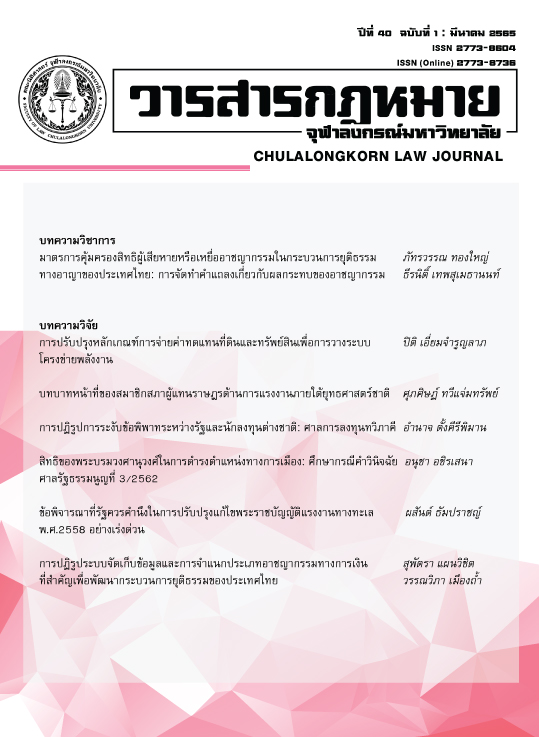ข้อพิจารณาที่รัฐควรคำนึง ในการปรับปรุงแก้ไขพระราชบัญญัติแรงงานทางทะเล พ.ศ. 2558 อย่างเร่งด่วน
Main Article Content
บทคัดย่อ
คนประจำเรือคือผู้ปฏิบัติงานที่เป็นกำลังสำคัญในการขับเคลื่อนธุรกิจพาณิชยนาวีของไทยให้มีความเข้มแข็งและสามารถแข่งขันกับนานาชาติได้อย่างยั่งยืน แต่เนื่องจากการทำงานบนเรือเดินทะเลมีสภาพการจ้างและลักษณะการทำงานที่มีสภาพแวดล้อมซึ่งเสี่ยงต่ออันตรายสูง ต้องเผชิญกับคลื่นจัดลมแรงและภัยธรรมชาติอันมิอาจคาดหมายได้ล่วงหน้า รัฐจึงจำเป็นที่จะต้องตรากฎหมายที่ให้การคุ้มครองคนประจำเรือเป็นการเฉพาะเพื่อประโยชน์ในการอนุวัติการให้เป็นไปตามอนุสัญญาระหว่างประเทศว่าด้วยแรงงานทางทะเล พ.ศ. 2549 ก่อนที่จะเร่งดำเนินการให้สัตยาบันอนุสัญญาระหว่างประเทศดังกล่าว ดังนั้นเมื่อพระราชบัญญัติแรงงานทางทะเล พ.ศ. 2558 ออกมามีผลบังคับใช้แล้ว จึงส่งผลทำให้คนประจำเรือไทยได้รับผลกระทบในทางปฏิบัติหลาย ๆ ด้าน โดยเฉพาะการที่คนประจำเรือถูกให้ออกจากระบบประกันสังคมและกองทุนเงินทดแทนของรัฐ ทั้งๆ ที่เคยได้รับมาก่อนจากกฎหมายคุ้มครองแรงงานฉบับเดิม ซึ่งข้อเท็จจริงในการศึกษานี้ได้แสดงให้เห็นถึงเนื้อหาของบทบัญญัติเกี่ยวกับการคุ้มครองคนประจำเรือในบางมาตราที่ยังมีความไม่ชัดเจนและอาจไม่สอดคล้องกับอนุสัญญาฯ ดังกล่าวด้วย โดยการศึกษาวิจัยนี้จะมุ่งนำเสนอปัญหาและการปรับปรุงแก้ไขกฎหมายแรงงานทางทะเลของไทยอย่างเร่งด่วน เพื่อที่จะผลักดันทำให้คนประจำเรือได้รับความคุ้มครองที่เป็นธรรมและเข้าถึงสวัสดิการแห่งรัฐได้อย่างทัดเทียมกับลูกจ้างทั่วไปบนบก เพื่อยกระดับมาตรฐานการคุ้มครองคนประจำเรือให้สูงขึ้นและเป็นการส่งเสริมให้อาชีพคนประจำเรือเป็นงานที่มีคุณค่า (Decent Work) สอดคล้องกับเจตนารมณ์ของอนุสัญญาระหว่างประเทศดังกล่าว
Article Details

อนุญาตภายใต้เงื่อนไข Creative Commons Attribution-NonCommercial-NoDerivatives 4.0 International License.
ลิขสิทธิ์และเนื้อหาในเว็บไซต์ของวารสารกฎหมาย (รวมถึง โดยไม่จำกัดเฉพาะ เนื้อหา รหัสคอมพิวเตอร์ งานศิลป์ ภาพถ่าย รูปภาพ ดนตรีกรรม โสตทัศนวัสดุ) เป็นกรรมสิทธิ์ของวารสารกฎหมาย และผู้ได้รับการโอนสิทธิทุกราย
1. วารสารกฎหมาย ให้อนุญาตให้คุณใช้สิทธิอันไม่เฉพาะเจาะจงที่สามารถถูกถอนเมื่อใดก็ได้ โดยไม่มีค่าใช้จ่าย ในการ
- เยี่ยมชมเว็บไซต์และเอกสารในเว็บไซต์นี้ จากคอมพิวเตอร์หรือเครื่องมือสื่อสารผ่านเว็บบราวเซอร์
- คัดลอกและจัดเก็บเว็บไซต์และเอกสารในเว็บไซต์นี้บนลงคอมพิวเตอร์ของคุณผ่านระบบความจำ cache
- สั่งพิมพ์เอกสารจากเว็บไซต์นี้สำหรับการใช้ส่วนตัวของคุณ
- ผลงานที่ได้รับการตีพิมพ์โดยวารสารกฎหมาย จุฬาลงกรณ์มหาวิทยาลัย ถูกคุ้มครองภายใต้ Creative Commons Attribution 4.0 International License ซึ่งอนุญาตให้ทุกคนสามารถคัดลอก แจกจ่าย ดัดแปลง ส่งต่อ ผลงานได้ ก็ต่อเมื่อผลงานและแหล่งข้อมูลได้รับการอ้างอิงอย่างเหมาะสม
2. วารสารกฎหมาย จุฬาลงกรณ์มหาวิทยาลัย สงวนสิทธิ์ไม่อนุญาตให้คุณใช้สิทธิอื่นใดที่เกี่ยวข้องกับเว็บไซต์และเอกสารบนเว็บไซต์นี้ เช่น การคัดลอก ดัดแปลง เปลี่ยนแปลง ส่งต่อ ตีพิมพ์ แจกจ่าย เผยแพร่ จัดแสดงในที่สาธารณะ ไม่ว่าจะในรูปแบบใดก็ตาม ซึ่งเว็บไซต์หรือเอกสารบนเว็บไซต์ โดยไม่อ้างอิงถึงแหล่งข้อมูลหรือโดยไม่ได้รับอนุญาตเป็นลายลักษณ์อักษรจากวารสารกฎหมาย จุฬาลงกรณ์มหาวิทยาลัย
3. คุณอาจขออนุญาตที่จะใช้เอกสารอันมีลิขสิทธิ์บนเว็บไซต์นี้โดยการเขียนอีเมลล์มายัง journal@law.chula.ac.th
4. วารสารกฎหมาย จุฬาลงกรณ์มหาวิทยาลัย เข้มงวดกับการคุ้มครองลิขสิทธิ์อย่างมาก หากวารสารกฎหมาย จุฬาลงกรณ์มหาวิทยาลัยพบว่าคุณได้ใช้เอกสารอันมีลิขสิทธิ์บนเว็บไซต์นี้โดยไม่ถูกต้องตามการอนุญาตให้ใช้สิทธิ ดังที่กล่าวไปข้างต้น วารสารกฎหมาย จุฬาลงกรณ์มหาวิทยาลัยอาจดำเนินคดีตามกฎหมายต่อคุณได้ เพื่อเรียกร้องค่าเสียหายที่เป็นตัวเงินและคำขอชั่วคราวให้คุณหยุดการใช้เอกสารดังกล่าว ทั้งนี้ คุณอาจถูกสั่งให้ชดใช้ค่าใช้จ่ายใดๆ ที่เกี่ยวข้องกับการดำเนินการตามกฎหมายนี้
หากคุณพบเห็นการใช้เอกสารอันมีลิขสิทธิ์ของวารสารกฎหมาย จุฬาลงกรณ์มหาวิทยาลัย ที่ขัดหรืออาจขัดต่อการอนุญาตให้ใช้สิทธิดังที่ได้กล่าวไปข้างต้น โดยเชื่อว่าได้ละเมิดลิขสิทธิ์ของคุณหรือของผู้อื่น สามารถร้องเรียนมาได้ที่ journal@law.chula.ac.th


